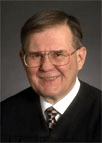
|
| Judge Wygonik |
According to those who attended the Aug. 15 meeting at the Arab American National Museum, Wygonik and representatives of the Congress of Arab American Organizations (CAAO) agreed the judge should draft a statement of apology acknowledging having caused a “misunderstanding,” without admitting to having made all of the comments.
Wygonik allegedly made the remarks during a private conversation with Dearborn Heights City Councilman Tom Berry, whom the judge may not have known is, himself, an Arab American.
The judge has admitted to making comments critical of fugitive former Dearborn businessman Talal Chahine, but denied, as asserted by Berry, making general or specific negative remarks about Arab American parents of Fordson High and Salina School students.
Imad Hamad, Regional Director of the American Arab Anti-Discrimination Committee, one of the community representatives who confronted Wygonik at the meeting said he is comfortable with the outcome.
“I think it’s fine, as long as all acknowledge the serious nature of it, all acknowledge that it was wrong… There were no efforts to sugarcoat the matter or brush it aside,” he said. “We had an open, candid, straightforward discussion.”
Hamad said that while no one questioned Berry’s credibility, Wygonik made a “sincere, genuine expression that this was a misunderstanding” and that he is grateful for support he has received from Arab Americans during and since his election campaign in 2006.
“The statement is not going to address the details,” Hamad said, but it should include a “clear, direct apology and expression of respect for the community.”
He said the statement will address the community through CAAO and is expected to be drafted before the end of August.
Hamad said the agreement and the series of meetings that led to it served to send a message that the community closely follows and holds accountable all elected officials, especially those who received support from Arab American groups and individuals during the election process.
“I think the message was very clear,” he said. “If this goes through and the judge delivers the proper wording, I see us moving forward past this unfortunate experience.”
Wygonik’s attorney, Noel Saleh, who is an Arab American, said Wygonik presented a letter at the meeting signed by several Arab American lawyers who have appeared in his court, attesting to a record of fair treatment toward them and their clients.
Hamad said that while the letter was useful and appreciated, some at the meeting were frustrated that attorney Helal Farhat, who drafted the letter, did not disclose its initiation at an earlier meeting among community leaders held on July 25. The letter was dated July 24.
Farhat did not respond to a voice mail message seeking comment as of press time.
Saleh described the outcome of the meeting “amicable and reasonable for all parties.”
He said he hopes that in addition to the statement from Wygonik, CAAO and the judge will release a joint press release detailing to the public how the situation was addressed and explaining its resolution.
“Judge Wygonik reaffirmed his respect and admiration for the Arab American community and he reaffirmed that all persons that enter his courtroom will be treated with that respect,” Saleh said.
The CAAO representatives who met with Wygonic along with Hamad were attorney Michael Berry, Kalid Shajrah of the Yemeni American Political Action Committee and Ali Belaid of the Yemeni American Benevolent Association. President of the Arab American Politial Action Committee — which endorsed the judge in the 2006 November election —Osama Siblani, who is also Publisher The Arab Ameriacn News, was scheduled to attend but was out of the country. He said he fully supported the meeting and its outcome as a resolution to the issue offering the community peace of mind.






Leave a Reply